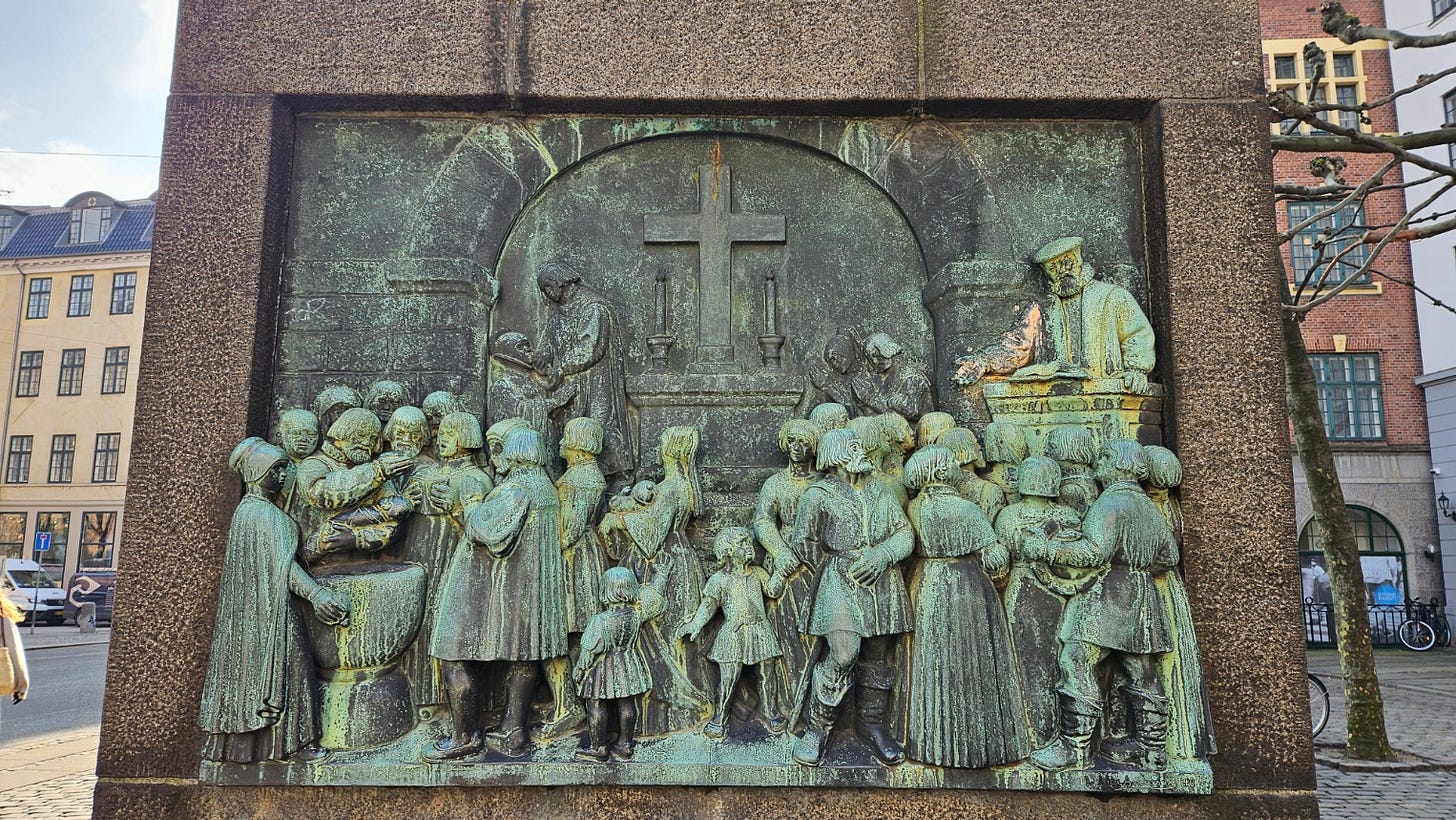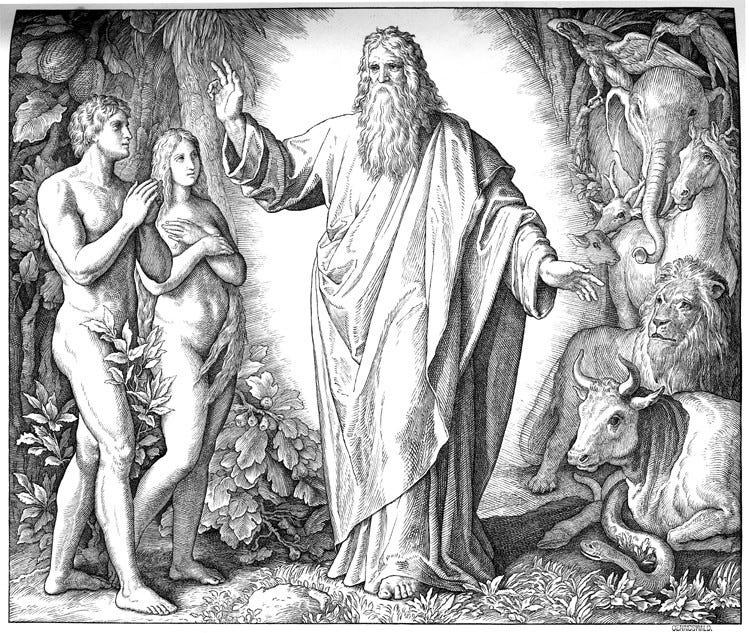I was privileged to present three lectures at the Luther Study Day’s in Herning, Denmark last weekend. They asked for lectures regarding (1) Our Original Righteousness, (2) The Council of God and the Conscience, and (3) That Christ is Our Righteousness according to both Natures.
It was wonderful to see old friends, meet new ones, and find the Lord’s people fighting to hold on to the good confession.
I put together a few notes on the image of God from Luther and the Lutheran Confessions, which I think you will enjoy.
The Image of God is Original Righteousness
The Divine Council
Then God said, “Let us make man in our image, after our likeness. And let them have dominion over the fish of the sea and over the birds of the heavens and over the livestock and over all the earth and over every creeping thing that creeps on the earth.”
So God created man in his own image,
in the image of God he created him;
male and female he created them. (Genesis 1:26-27)
Luther on the Image of God
I am afraid that since the loss of this image through sin we cannot understand it to any extent. (LW 1:61)
Therefore the image of God, according to which Adam was created, was something far more distinguished and excellent, since obviously no leprosy of sin adhered either to his reason or to his will. Both his inner and his outer sensations were all of the purest kind. His intellect was the clearest, his memory was the best, and his will was the most straightforward—all in the most beautiful tranquillity of mind, without any fear of death and without any anxiety. To these inner qualities came also those most beautiful and superb qualities of body and of all the limbs, qualities in which he surpassed all the remaining living creatures. I am fully convinced that before Adam’s sin his eyes were so sharp and clear that they surpassed those of the lynx and eagle. He was stronger than the lions and the bears, whose strength is very great; and he handled them the way we handle puppies. Both the loveliness and the quality of the fruits he used as food were also far superior to what they are now. (LW 1:62)
Therefore my understanding of the image of God is this: that Adam had it in his being and that he not only knew God and believed that He was good, but that he also lived in a life that was wholly godly; that is, he was without the fear of death or of any other danger, and was content with God’s favor. In this form it reveals itself in the instance of Eve, who speaks with the serpent without any fear, as we do with a lamb or a dog. For this reason, too, if they should transgress His command, God announces the punishment: “On whatever day you eat from this tree, you will die by death,” as though He said: “Adam and Eve, now you are living without fear; death you have not experienced, nor have you seen it. This is My image, by which you are living, just as God lives. But if you sin, you will lose this image, and you will die.” (LW 1:62-62)
Therefore when we speak about that image, we are speaking about something unknown. Not only have we had no experience of it, but we continually experience the opposite; and so we hear nothing except bare words. In Adam there was an enlightened reason, a true knowledge of God, and a most sincere desire to love God and his neighbor, so that Adam embraced Eve and at once acknowledged her to be his own flesh. (LW 1:63)
Therefore that image of God was something most excellent, in which were included eternal life, everlasting freedom from fear, and everything that is good. However, through sin this image was so obscured and corrupted that we cannot grasp it even with our intellect. Although we utter the words, who is there who could understand what it means to be in a life free from fear, without terrors and dangers, and to be wise, upright, good, and free from all disasters, spiritual as well as physical? (LW 1:65)
Lutheran Confessions on the Image of God
This the Scripture shows when it says that man was created in the image of God and after his likeness (Gen. 1:27). What else is this than that a wisdom and righteousness was implanted in man that would grasp God and reflect him, that is, that man received gifts like the knowledge of God, fear of God, and trust in God? (Ap III.18)
In Eph. 5:9 and Col. 3:10 Paul shows that the image of God is the knowledge of God, righteousness, and truth. (Ap III.20)
Furthermore, that original sin is the complete lack or absence of the original concreated righteousness of paradise or of the image of God according to which man was originally created in truth, holiness, and righteousness, together with a disability and ineptitude as far as the things of God are concerned. (FC.SD I:10)
That original sin in human nature is not only a total lack of good in spiritual, divine things, but that at the same time it replaces the lost image of God in man with a deep, wicked, abominable, bottomless, inscrutable, and inexpressible corruption of his entire nature in all its powers, especially of the highest and foremost powers of the soul in mind, heart, and will. (FC.SD I:11)
Quenstadt:
The IMAGE OF GOD is a natural perfection, consisting in an entire conformity with the wisdom, justice, immortality, and majesty of God, which was divinely created in the first man, in order that he might perfectly know, love, and glorify God, his Creator. (11.9, quoted by Schmid, Doctrine Theology of the Evangelical Lutheran Church, 239)
Practical Application: We are made of “moldable” stuff
Their idols are silver and gold,
the work of human hands.
They have mouths, but do not speak;
eyes, but do not see.
They have ears, but do not hear;
noses, but do not smell.
They have hands, but do not feel;
feet, but do not walk;
and they do not make a sound in their throat.
Those who make them become like them;
so do all who trust in them. (Psalm 115:4-8, see Psalm 135)
Luther Comments: “He speaks prophetically, in the first place, because they themselves will also become images and idols, not by nature, but by similarity, as Zech. 11:17 says: “O shepherd and idol,” because they are vain. A remarkable love of one’s own powers does all these things, a love which changes the lover into the beloved, as blessed Augustine says: “Love the earth, and you are earth; love gold, and you are gold; love God and you are God.”” (LW 11:399)
God’s Image Lost, but…
This is the book of the generations of Adam. When God created man, he made him in the likeness of God. 2 Male and female he created them, and he blessed them and named them Man when they were created. 3 When Adam had lived 130 years, he fathered a son in his own likeness, after his image, and named him Seth. (Genesis 5:1-3)
“Whoever sheds the blood of man, by man shall his blood be shed, for God made man in his own image.” (Genesis 9:6)
With it we bless our Lord and Father, and with it we curse people who are made in the likeness of God. (James 3:9)
…the light of the gospel of the glory of Christ, who is the image of God. (2 Corinthians 4:4, see Colossians 1:15, Hebrews 1:3)
And we all, with unveiled face, beholding the glory of the Lord, are being transformed into the same image from one degree of glory to another. For this comes from the Lord who is the Spirit. (2 Corinthians 3:18, see Ephesians 4:24)
Just as we have borne the image of the man of dust, we shall also bear the image of the man of heaven. (1 Corinthians 15:49)
“Behold the man”
Pascal: For in fact, if man had never been corrupt, he would enjoy in his innocence both truth and happiness with assurance; and if man had always been corrupt, he would have no idea of truth or bliss. But, wretched as we are, and more so than if there were no greatness in our condition, we have an idea of happiness and can not reach it. We perceive an image of truth and possess only a lie. Incapable of absolute ignorance and of certain knowledge, we have thus been manifestly in a degree of perfection from which we have unhappily fallen. (Pensées, 434)
Psalm 8, What is man, that You are mindful of him?
Plato: “Man is a featherless biped.” Diogenes (and Pontius Pilate), “Behold the man.”
Christ is risen!
PrBW
Wednesday What-Not is a *free* newsletter. Your subscription is a helpful donation. Thanks!
For more theology, upcoming events, and links to video, audio, etc. visit www.wolfmueller.co.






